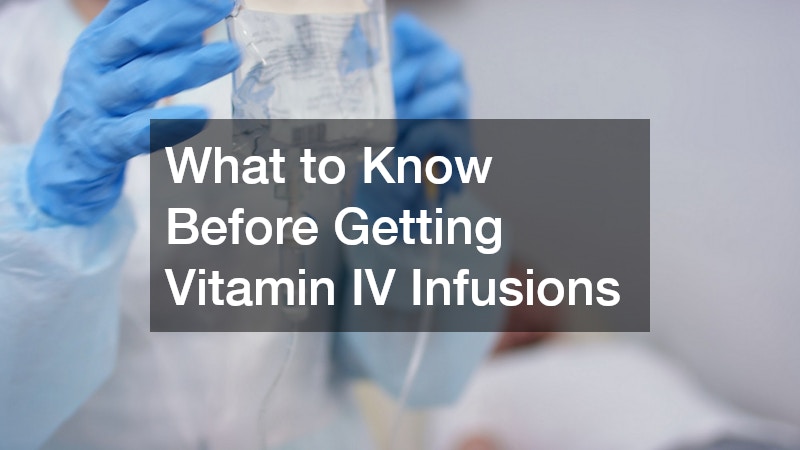
In recent years, vitamin IV infusions have gained popularity as a health and wellness trend. Many people are turning to this method as a quick way to boost their nutrient intake. However, there are several considerations to be mindful of before opting for this treatment.
How Do Vitamin IV Infusions Work?
Understanding the Science Behind IV Infusions
Vitamin IV infusions involve administering vitamins and minerals directly into the bloodstream. This process bypasses the digestive system, allowing for a quicker and more efficient absorption of nutrients. The method is especially advantageous for individuals with conditions that inhibit nutrient absorption through traditional oral supplementation.
By infusing vitamins directly, higher concentrations of nutrients can be delivered to the body’s cells efficiently. This has potential benefits for rapid rehydration, medication delivery, and treatment of nutrient deficiencies. However, the effectiveness may vary depending on the individual’s health conditions and the specific vitamins being administered.
Types of Vitamins and Nutrients Used
Vitamin IV infusions typically involve a variety of vitamins and minerals based on a person’s specific needs. Commonly used ingredients include vitamin C, vitamin B complex, magnesium, calcium, and amino acids. The selection often depends on the desired outcome — whether it’s boosting energy levels, improving immunity, or enhancing skin health.
Clinics offering IV therapy often provide tailored nutrient mixes, promoting personalized healthcare. A healthcare provider might assess an individual’s diet, lifestyle, and health conditions before determining the appropriate mix of nutrients. This customization is a key reason for the popularity of vitamin IV infusions despite their higher cost compared to oral supplements.
What Are the Potential Benefits?
Boosting Immunity and Energy Levels
Many clients seek vitamin IV infusions to enhance their immune response and boost energy levels. High doses of vitamins like C and B can help address fatigue and support the immune system, which is particularly appealing for individuals facing significant stress or recovering from illness.
Immune support via IV therapy is often marketed, especially during flu season or after travel. While the high doses can temporarily bolster immune function, maintaining a balanced diet and healthy lifestyle are still essential. It’s important to note that while many users report feeling revitalized, individual results can vary.
Addressing Nutrient Deficiencies
IV therapy provides an effective and quick way to address specific nutrient deficiencies. This is especially beneficial for individuals with malabsorption issues or those who can’t take oral supplements for various reasons. By correcting these deficiencies, individuals often experience improved overall health and well-being.
Nutrient deficiencies can manifest in several forms, including fatigue, weak immunity, and poor mental focus. Administering vitamins intravenously offers a controlled method to directly target and replenish these deficiencies. However, such treatments should be guided by thorough blood work and medical advice to ensure safety and efficacy.
Improving Mental Clarity and Focus
Some clients report improved mental clarity and focus following IV infusions. Nutrients like magnesium, B vitamins, and amino acids can contribute to enhanced cognitive function. This can be especially beneficial for professionals facing demanding work environments or students under academic stress.
Improved mental clarity translates to heightened productivity and better problem-solving abilities. Certain vitamins play significant roles in neurotransmitter health, and their efficient delivery via IV can positively affect brain function. Regular users claim palpable improvements, although individual experiences may vary widely.
What Are the Risks and Side Effects?
Potential Adverse Reactions
Like any medical procedure, vitamin IV infusions present certain risks and side effects. Common reactions can include vein irritation, infection, or allergic reactions to the ingredients used. It’s critical to monitor for any adverse symptoms both during and after the administration.
The introduction of a foreign object and substance into the body always carries an element of risk. More severe reactions, though rare, could necessitate emergency medical attention. Consequently, undergoing such treatments in a sterile and supervised environment is vital to minimize risks.
Risk of Overdosing on Vitamins
Another significant concern with IV therapy is the risk of overdosing on vitamins. High doses of certain nutrients might lead to toxicity rather than benefits. Specifically, fat-soluble vitamins like A, D, E, and K can accumulate in the body and lead to complications.
Clinics must have strict protocols to prevent vitamin over-administration. Ensuring that infusions are appropriately tailored and not driven by mere client demand protects both provider and patient. Consultation with a medical professional can provide clarity on what’s beneficial versus excessive.
Screening and Safety Protocols
Screening and safety protocols are critical to determining whether a candidate is suitable before beginning IV therapy. Reputable clinics perform thorough evaluations to tailor treatments to individual health profiles. These practices not only assure safety but also optimize the treatment’s effectiveness.
Proper screening involves assessing current medications, pre-existing conditions, and specific health goals. This minimizes the risk of adverse interactions or ineffective treatments. Transparency and adequate safety protocols elevate the standard of care provided by professional clinics.
Before choosing to undergo vitamin IV infusions, it’s crucial to be informed about how they work, the potential benefits and risks, and how to select the right provider. By comprehensively understanding these factors, individuals can make informed choices about their health and wellness journeys. Armed with knowledge, you can safely navigate this popular but complicated aspect of modern wellness.


